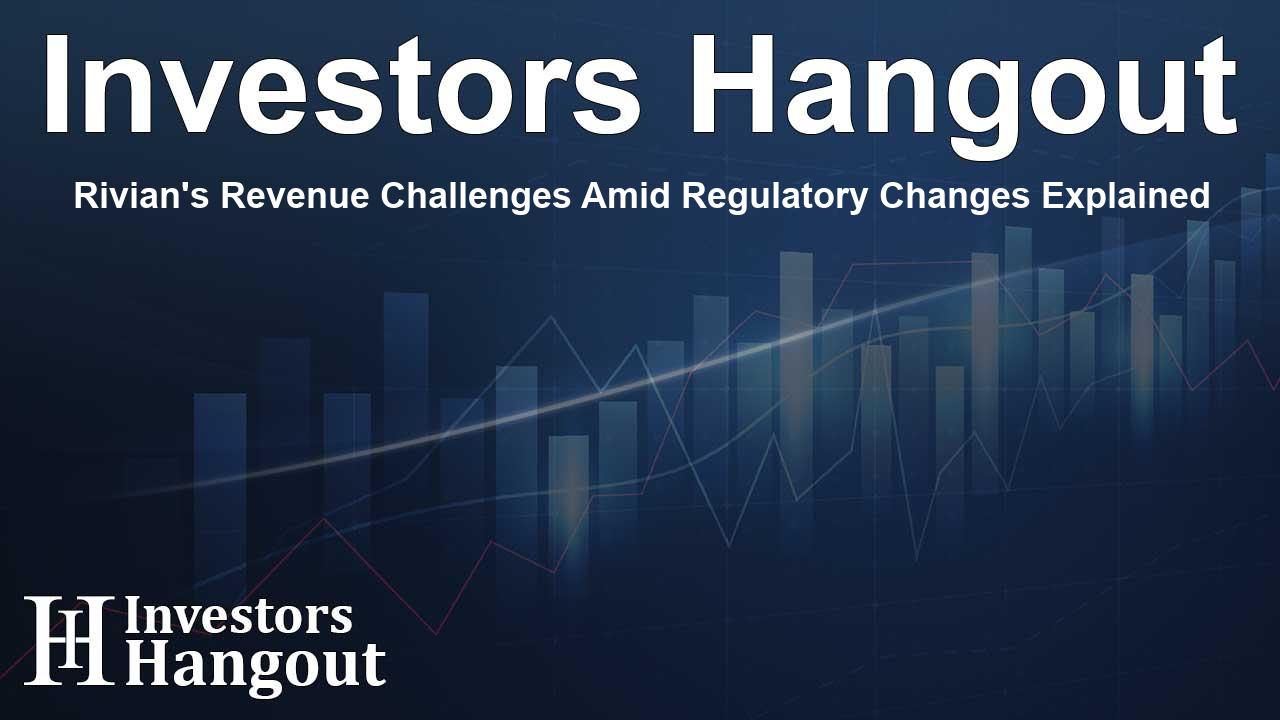Rivian's Revenue Challenges Amid Regulatory Changes Explained

Impact of Regulatory Changes on Rivian's Revenue
The rollback of fuel economy rules has raised crucial revenue concerns for Rivian RIVN and similar companies in the electric vehicle (EV) sector.
NHTSA Actions Affect Fuel Economy Credits
Changes introduced by the Trump administration, including the elimination of penalties concerning fuel economy parameters, prompted the National Highway Traffic Safety Administration (NHTSA) to stop the processing of necessary documentation for issuing credits. This pause has far-reaching effects.
Currently, approximately $100 million in revenue that Rivian and its industry peers anticipated has been temporarily frozen, significantly impacting their financial outlook. These companies heavily rely on the sale of regulatory credits to offset costs associated with meeting strict environmental standards.
Challenges Faced by Rivian in Completing Transactions
Rivian's director of public policy, Christopher Nevers, noted that the company had previously established agreements to obtain regulatory credits. However, due to the recent policy changes, completing these transactions has become increasingly challenging.
The Zero Emission Transportation Association, which advocates for the electric vehicle industry, has taken steps by petitioning the U.S. Court of Appeals in Washington, D.C. They are pushing for the NHTSA to proceed with issuing compliance letters that indicate whether automakers are in alignment with fuel economy regulations.
Broader Implications for Electric Vehicle Manufacturers
This regulatory rollback has serious consequences for the entire EV landscape. Major players like Tesla Inc. TSLA have reported significant earnings from regulatory credits, illustrating just how vital these payments are to sustaining their financial health.
For instance, Tesla had originally earned around $2.76 billion from ZEV credits in 2024 before the revision in policy diminished this revenue stream. It underscores the precarious financial positioning that many EV manufacturers face in light of shifting government regulations.
Lucid Group Also Affected by Policy Shifts
Rivian is not alone in facing these hurdles. Other manufacturers, such as Lucid Group Inc. LCID, are grappling with their own unique financial challenges. The elimination of fuel credit opportunities only intensifies existing concerns about cash flow.
The current dynamics highlight the critical role of regulatory credits in maintaining liquidity within the electric vehicle sector. As financial pressures mount, companies must adapt to ensure sustainability while navigating fluctuating political climates.
Rivian's Market Position and Future Prospects
Based on recent evaluations, Rivian has been assigned a growth score of 24.0% alongside a value rating of 67.76%, indicating its potential to bounce back in a challenging market. Investors and stakeholders are closely observing how well Rivian navigates through these fiscal obstacles and what steps they will take to ensure long-term viability.
Frequently Asked Questions
What is causing Rivian's revenue shortfall?
The withdrawal of fuel economy regulations and the halt in issuing compliance paperwork have frozen significant revenue streams for Rivian.
How does the NHTSA's action affect Rivian?
The NHTSA's suspension of paperwork needed for credit transactions has left Rivian and its competitors unable to finalize essential revenue-generating agreements.
What is the significance of regulatory credits for EV companies?
Regulatory credits provide essential financial support, helping EV manufacturers offset costs associated with compliance and maintain profitability.
Are there other companies facing similar challenges?
Yes, major players like Tesla and Lucid Group also struggle with revenue loss from the elimination of fuel credits due to regulatory changes.
What does the future hold for Rivian amidst these challenges?
Rivian aims to reclaim lost opportunities and strengthen its market position through strategic adaptations to their business model despite current setbacks.
About The Author
Contact Caleb Price privately here. Or send an email with ATTN: Caleb Price as the subject to contact@investorshangout.com.
About Investors Hangout
Investors Hangout is a leading online stock forum for financial discussion and learning, offering a wide range of free tools and resources. It draws in traders of all levels, who exchange market knowledge, investigate trading tactics, and keep an eye on industry developments in real time. Featuring financial articles, stock message boards, quotes, charts, company profiles, and live news updates. Through cooperative learning and a wealth of informational resources, it helps users from novices creating their first portfolios to experts honing their techniques. Join Investors Hangout today: https://investorshangout.com/
The content of this article is based on factual, publicly available information and does not represent legal, financial, or investment advice. Investors Hangout does not offer financial advice, and the author is not a licensed financial advisor. Consult a qualified advisor before making any financial or investment decisions based on this article. This article should not be considered advice to purchase, sell, or hold any securities or other investments. If any of the material provided here is inaccurate, please contact us for corrections.
